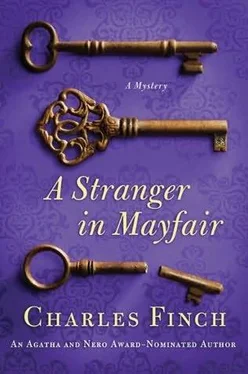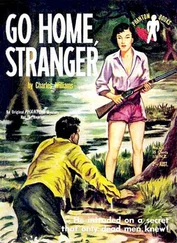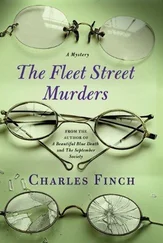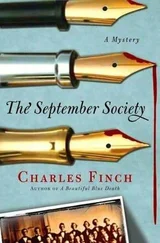Charles Finch - A Stranger in Mayfair
Здесь есть возможность читать онлайн «Charles Finch - A Stranger in Mayfair» весь текст электронной книги совершенно бесплатно (целиком полную версию без сокращений). В некоторых случаях можно слушать аудио, скачать через торрент в формате fb2 и присутствует краткое содержание. Жанр: Исторический детектив, на английском языке. Описание произведения, (предисловие) а так же отзывы посетителей доступны на портале библиотеки ЛибКат.
- Название:A Stranger in Mayfair
- Автор:
- Жанр:
- Год:неизвестен
- ISBN:нет данных
- Рейтинг книги:3 / 5. Голосов: 1
-
Избранное:Добавить в избранное
- Отзывы:
-
Ваша оценка:
- 60
- 1
- 2
- 3
- 4
- 5
A Stranger in Mayfair: краткое содержание, описание и аннотация
Предлагаем к чтению аннотацию, описание, краткое содержание или предисловие (зависит от того, что написал сам автор книги «A Stranger in Mayfair»). Если вы не нашли необходимую информацию о книге — напишите в комментариях, мы постараемся отыскать её.
A Stranger in Mayfair — читать онлайн бесплатно полную книгу (весь текст) целиком
Ниже представлен текст книги, разбитый по страницам. Система сохранения места последней прочитанной страницы, позволяет с удобством читать онлайн бесплатно книгу «A Stranger in Mayfair», без необходимости каждый раз заново искать на чём Вы остановились. Поставьте закладку, и сможете в любой момент перейти на страницу, на которой закончили чтение.
Интервал:
Закладка:
“Yes, of course.”
“You’ve no idea what it’s like to have as your first landed ancestor a common man-a blacksmith, no less. We could have owned three-quarters of Wiltshire and none of the families there would have cared about us. Oh, there were the merchants. To be sure we were above them, or the new generations. We had some status. We built churches.
“But a blacksmith! My father brooded about it every day of his life. When I did something wrong I was the son of a whore and a smith to him. When we were snubbed by the Duke of Argyllshire it was ‘Back to the hammer and tongs.’ It was the worst terror to be taken out to the smithy and beaten by the blacksmith there.”
Lenox didn’t speak; Ludo, lost in reminiscence, didn’t seem to mind.
“Elizabeth made it worse. Her father was a lord, yes, but only an Irish lord…I think we-what is it called when two people live inside the same dream together, Lenox?”
“I don’t know.”
“There must be a word for it.” He waved a dismissive hand and stood up. “It’s all history now, anyway. I’m taking Marie, too, with me. To the Hall. Marie Clarke. Perhaps she’ll forgive me one day.”
“I hope so.”
Ludo gathered his cloak and hat. “There are second chances in life, after all. Aren’t there?”
It had indeed been in the papers, and inevitably Lenox’s name had, too. Elizabeth Starling likely wouldn’t hang, but she would certainly be in prison for the rest of her life. Lenox had debated in his own mind whether to go visit her, and seek out more explanation, but in the end he decided that there wasn’t anything else. He knew what there was to know.
Although there was a sour postscript from Percy Field, in the hallway.
“Tell me,” Lenox said, “was Ludo close to receiving a title? In the New Year’s Honors?”
Titles were in the hands of the Queen, of course, but more and more often she received recommendations from Field’s superior, the Prime Minister. Field would almost certainly have seen the list.
He snorted. “Mr. Lenox, have you heard of a man of Ludovic Starling’s age and position becoming a baron out of the blue? It was the purest fantasy. He agitated, to be sure, for it, but even to be knighted! Why-it was impossible.”
“If you’ll allow me to ask something rude, Mr. Field: Are you only saying so now, because of what happened last week?”
Field laughed. “I would tell you the truth if it were so, Mr. Lenox. You’re a man who can keep his lips sealed. It was a fantasy, nothing more and nothing less.”
Chapter Forty-Nine
That was a heavy-hearted fall for Charles Lenox. As September passed into October and October into November, he felt weighed down by both the needless misery of the case and the slight, constant disappointment of Parliament not being the paradise he had wished it. This he came to terms with slowly, but surely; it was his duty. He referred two cases that came his way to Dallington, who solved the first and botched the second terribly. They were no longer daily companions, but they had taken to dining together two or three times a week. What they did during these meals was go over old cases, teasing through the clues, Lenox pushing his apprentice gently in the right direction, teaching him to think like a detective. Gradually Lenox discovered that they were the best parts of his week, these dinners-a visit to his old life. Still, when the third case came in early December, he turned it toward Dallington and, after the entreating visitor had gone, turned back to a new blue book.
It was around this time that he realized there had been a third unhappiness, too. His marriage. He and Lady Jane were best friends as ever, and they had a dozen different parties and balls they might have attended each week.
Yet he found he wanted something different. Each time he was with Toto, Thomas, and George, his heart ached with envy.
This blue period finally lifted one day in the first week of December. They had been at the McConnells’ that night for supper, and the McConnells were returning the visit the next day, to trim Lady Jane and Lenox’s Christmas tree. As they were riding home in the carriage, Lenox sensed that Lady Jane had come close to bringing up the subject of a child. At the last moment, however, she didn’t.
He was in Parliament the next morning, meeting with a committee. There was no session in the evening, and he returned to their double-house on Hampden Lane hungry for lunch.
Instead of Kirk it was Jane herself who met him at the door.
“Will you guess where I’ve been this morning?” she asked.
“Where?” he said, giving her a kiss on her soft, pink cheek.
“Only to Kent!”
He hung up his cloak. “Have you really? Whatever for?”
“It was an hour each way-not far, really-but I found you a present.”
“In Kent? Thank you, darling. You’re lovely. May I open it after lunch? I’m famished.”
He was headed toward his study, about to open the door, and she said, “You’re going to open it this second.”
He frowned, puzzled, until he twisted the door.
Two puppies, neither of them bigger than a loaf of bread, came bounding out of the room in a state of profound excitement.
One was dark, midnight black, and the other was a pure white gold. They were retrievers. Both of them had floppy ears and thick coats, and they tumbled over each other into Lenox’s ankles, barking in happy voices at his arrival.
With an enormous smile on his face he bent down to them. “What are they?” he said.
“I would have thought a child could identify them as dogs-puppies.”
“I mean-well, why?”
Then Lady Jane did something touching to him; she came and knelt by him, letting the puppies jump into her lap, and put an arm through his. “I’m not ready-not quite yet,” she said. “Can we wait one more year?”
He looked at her, and love, love greater than himself, filled his heart. “Of course,” he said.
“I thought perhaps we could practice on them.”
“A capital notion, that. What shall we call them?”
“I want to call the black one Bear. She looks like a bear to me.”
“And the white one?”
She laughed. “Well-he reminds me of a rabbit.”
Lenox smiled. “Bear and Rabbit. It’s settled.”
As if they understood, Bear and Rabbit started to bark again, then chased each other around Lenox, first in one direction and then the other, occasionally felled by their new legs or stopping for a judicious sniff of shoe or rug. He loved them already.
It was later that afternoon that his blue period truly ended. He was sorting through old mail (and had just found Clara Woodward’s wedding invitation) when Graham, who stayed long hours in Whitehall, came home unaccustomedly early. He drew up short when he saw Bear and Rabbit, remembered they weren’t his responsibility, and then made an urgent petition for an immediate conference with Lenox.
“Whatever is it?”
Graham, usually so reserved, was flushed with enthusiasm. “It’s your speech, sir. They want you to give your maiden speech.”
“What?”
“The party leaders. They’d like you to speak in two days’ time. During the afternoon session, sir, when all the press will be there! In time for the evening papers.”
“A speech? In two days? Not now, Bear!” he said to the little black retriever, who was pawing at his shoe.
“Yes, sir.”
Suddenly every nerve in Lenox’s body began to tingle, and he felt his brain begin to race. And in the same moment he realized: This was the thrill he had wanted all along.
The next fifty hours was a period of ceaseless activity. Lenox, closeted in his study, skipped the blue books that accumulated on his desk and instead wrote feverishly. Graham would come into the room every half hour or so and take away a much crossed and scratched and corrected piece of paper, consult with Lenox about his intentions for this part of the speech, and then take it to Frabbs, who was stationed in the dining room, to make a fair copy for further revision.
Читать дальшеИнтервал:
Закладка:
Похожие книги на «A Stranger in Mayfair»
Представляем Вашему вниманию похожие книги на «A Stranger in Mayfair» списком для выбора. Мы отобрали схожую по названию и смыслу литературу в надежде предоставить читателям больше вариантов отыскать новые, интересные, ещё непрочитанные произведения.
Обсуждение, отзывы о книге «A Stranger in Mayfair» и просто собственные мнения читателей. Оставьте ваши комментарии, напишите, что Вы думаете о произведении, его смысле или главных героях. Укажите что конкретно понравилось, а что нет, и почему Вы так считаете.












